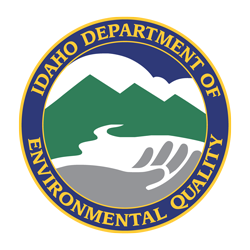Our planning grant program provides financial assistance to eligible wastewater and drinking water systems. These grant funds are typically used to develop facility plans to identify the most cost-effective, environmentally sound method of upgrading and expanding a system to achieve and maintain compliance with state and federal standards.
The number of grants each year is limited to the available funding and funds committed to the highest-ranked projects. Grants provide funding for up to 50% of eligible planning costs following IDAPA 58.01.22.030.02. Funding is typically subject to a maximum amount. For example, the maximum DEQ match amount for drinking water and wastewater planning grants has historically been $45,000 and $65,000, respectively. The remaining cost is the recipient’s responsibility.
This Year's Grant Recipients
The current fiscal year (July 1) grant recipients will be listed below.
DEQ awards $75,000 to two Idaho wastewater systems
January 3, 2025 Contact: MaryAnna Peavey, Grants and Loans Bureau Chief, MaryAnna.Peavey@deq.idaho.gov BOISE — The Idaho Department of Environmental Quality (DEQ) today awarded $75,000 to
DEQ awards $45,000 to city of Plummer
November 26, 2024
BOISE – The Idaho Department of Environmental Quality (DEQ) today announced the award of a $45,000 facility planning grant to the city of Plummer in Benewah County, Idaho.
DEQ awards $17,900 to Indian Village Water Users Association, Inc.
November 25, 2024
BOISE – The Idaho Department of Environmental Quality (DEQ) today announced the award of a $17,900 facility planning grant to Indian Village Water Users Association, Inc., in Canyon County, Idaho.
This accordion will not appear on the screen
Wastewater – Planning grants are available for counties, cities, special service districts, other governmental entities, and nonprofit corporations with the authority to collect, treat, or dispose of wastewater or otherwise provide direct water quality benefits.
Drinking Water: Planning grants are available to public water systems as defined by IDAPA 58.01.08, Idaho Rules for Public Drinking Water Systems and summarized below:
- Community Water System: A public water system that serves at least 15 service connections used by year-round residents or regularly serves at least 25 year-round residents.
- Non-community Water System: A public water system that serves the public but does not serve the same people year-round. A non-community water system is either transient or non-transient.
- Transient – Does not regularly serve at least 25 of the same people for more than six months per year (e.g., rest area or campground with its water supply).
- Non-Transient – Regularly serves at least 25 of the same people for more than six months per year (e.g., a school or hospital with its water supply).
Systems ineligible for planning grants generally include wastewater systems that are privately owned, non-community drinking water systems that are for profit, systems that lack the financial capability to pay for the non-grant share of a planning project, or those that are delinquent in payment of fines or fee assessments due to DEQ. (IDAPA 58.01.12.009 and IDAPA 58.01.22.007).
We contact eligible systems to apply for planning grants annually. Interested systems must submit a letter of interest (LOI) for the following fiscal year between October and January. DEQ evaluates, rates, and ranks the LOIs for inclusion on the next annual priority list. Rating criteria focus on potential public health and environmental risks, the extent to which the planning process will address the long-term viability of the system (i.e., sustainability), and the status of the system’s compliance with state and federal regulations. Rating forms and letters of interest can be found in the Resources section.
The highest-rated projects are invited to submit a planning grant application. The number of grants offered each year is limited to available funding. Systems selected to receive grants must hire a professional engineer to survey the system’s existing condition, develop and screen alternatives, recommend an alternative, and evaluate the potential environmental impacts. All grant recipients seeking State Revolving Fund financing require an environmental information document. Developing and implementing mitigation measures may be required as the project moves into design and construction.
Contact your DEQ regional office if interested in applying for a planning grant. Most systems find it in their best interest to have a consulting engineer assist them with completing the Letter of Interest. Please visit the Letter of Interest in the Resources section below for forms and deadline information.
This accordion will not appear on the screen
Grants and Loans Bureau Chief
Grants and Loans Supervisor
Grants and Loans Officer

